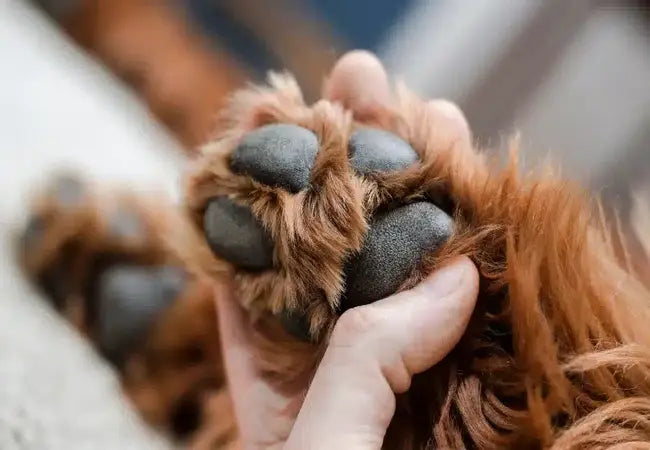Dog Paw Pad Burns: 2025 Vet-Approved Prevention & Treatment Guide 🐕🔥

In this article
🐾 Paw Pad Burns in Dogs: Prevention, Treatment & Recovery Guide (2025)
By Dr. Duncan Houston BVSc
Introduction
As temperatures rise, our canine companions face increased risks, especially concerning their sensitive paw pads. Walking on hot surfaces can lead to painful burns, impacting their mobility and overall well-being. This comprehensive guide delves into the causes, signs, treatments, and preventive measures to ensure your dog's paws remain healthy and protected.
🔥 Understanding Paw Pad Burns
What Are Paw Pads?
Paw pads are specialized skin on the bottom of a dog's feet, providing cushioning and protection during movement. They distribute pressure, aid in balance, and act as shock absorbers. However, these pads are susceptible to injuries, especially burns from hot surfaces.
Causes of Paw Pad Burns
- Hot Pavement: Asphalt and concrete can become extremely hot during summer, causing burns upon contact.
- Chemical Irritants: Substances like bleach, gasoline, or ice-melting salts can cause chemical burns.
- Friction: Running or playing on rough surfaces can lead to friction burns.
- Fire Exposure: Direct contact with flames or embers can result in severe burns.
🩺 Recognizing Signs of Paw Pad Burns
Early detection is crucial. Look out for:
- Limping or Reluctance to Walk: Indicates discomfort or pain.
- Licking or Chewing Paws: A response to irritation or injury.
- Redness or Blistering: Visible signs of burns.
- Peeling or Sloughing Skin: Indicates severe damage.
- Bleeding or Ulceration: Suggests deep burns requiring immediate attention.
If any of these signs are present, consult your veterinarian promptly.
🛠️ Treating Paw Pad Burns
Immediate Actions
- Cool the Area: Rinse the affected paw with cool (not cold) water for 10–15 minutes to alleviate pain and reduce inflammation.
- Avoid Ice: Direct application can cause further tissue damage.
- Prevent Licking: Use an Elizabethan collar to stop your dog from licking the wound.
Veterinary Care
Seek professional care for:
- Assessment: Determine the burn's severity.
- Cleaning and Debridement: Remove dead tissue to promote healing.
- Bandaging: Protect the area from infection and further injury.
- Medications: Antibiotics to prevent infection and pain relievers for comfort.
Home Care
- Change Bandages Regularly: Follow your vet's instructions to prevent infection.
- Limit Activity: Restrict walks and playtime to allow healing.
- Monitor for Infection: Watch for signs like increased redness, swelling, or discharge.
🛡️ Preventing Paw Pad Burns
- Check Surface Temperature: Place your hand on the pavement for 7 seconds; if it's too hot for you, it's too hot for your dog.
- Walk During Cooler Times: Early mornings or late evenings are safer.
- Use Protective Gear: Dog booties or paw wax can provide a barrier against hot surfaces.
- Avoid Hot Surfaces: Stick to grassy areas or shaded paths.
- Regular Paw Checks: Inspect your dog's paws after walks for any signs of injury.
🧴 Additional Tips for Paw Care
- Moisturize: Use dog-safe balms to keep paw pads supple.
- Regular Grooming: Trim excess hair between paw pads to prevent debris accumulation.
- Diet and Hydration: Ensure your dog has a balanced diet and stays hydrated to maintain skin health.
📱 Utilize Technology for Paw Health
- Ask A Vet App: Connect with veterinary professionals for advice on paw injuries and care routines.
- Woopf: Access training tools and resources to prevent behaviors that may lead to paw injuries.
- Purrz: Monitor your dog's activity levels and set reminders for paw checks and grooming sessions.
Conclusion
Paw pad burns are painful and can significantly impact your dog's quality of life. By understanding the causes, recognizing early signs, and implementing preventive measures, you can ensure your furry friend's paws remain healthy and injury-free. Always consult with your veterinarian for any concerns and utilize available resources to provide the best care for your pet.
For expert advice and personalized pet care plans, visit AskAVet.com and download the Ask A Vet app today! 🐾📲






